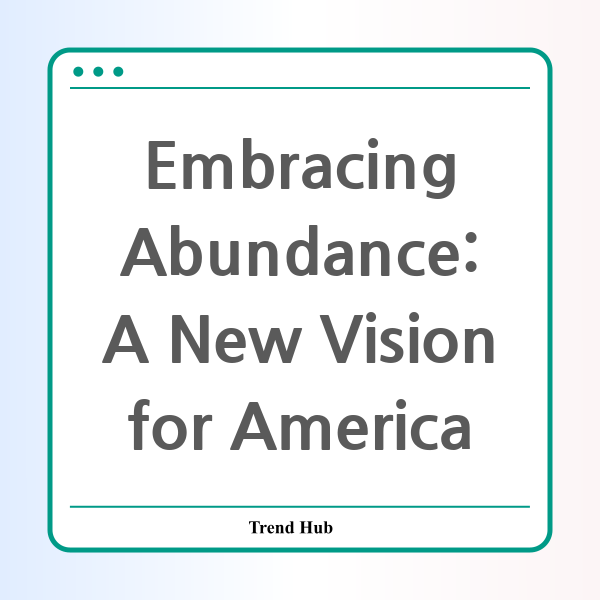* This website participates in the Amazon Affiliate Program and earns from qualifying purchases.

Have you ever felt that American politics is trapped in a never-ending cycle of scarcity, where every conversation turns into a debate over who deserves what? The recent discussions around Kevin Thompson and Ezra Klein’s book Abundance challenge this paradigm and propose a refreshing approach: an ideology of abundance.
America emerged from the COVID-19 pandemic with unprecedented stimulus efforts, a booming stock market, and a unique opportunity to reshape its economic landscape. The pandemic provided a blank slate for innovation, urging leaders and citizens alike to reconsider how resources are allocated and used. Instead of managing scarcity, could we be channeling our energies into fostering growth and abundance? This is the pivotal question posed by Abundance.
The authors argue that for decades, American politics has been distorted by a prevailing mindset that prioritizes limitations over possibilities. Housing and clean energy sectors, in particular, have been hindered by bureaucratic regulations and restrictive policies that limit construction and innovation. Cities like San Francisco and New York exemplify this crisis, as rising rents and unaffordable housing drive many residents out of their homes.
But what if we shifted our focus from limiting growth to encouraging it? By embracing a politics of abundance, we can transform our approach to key issues like housing, healthcare, and energy. Imagine policies that not only aim to provide resources to the needy but also actively grow the pie, leading to enhanced quality of life for everyone.
At the core of this dialogue is the notion that we can resolve our differences without falling into a petty zero-sum game. Whether you identify as a Democrat, Republican, or anything in between, the premise of abundance speaks to all Americans. We can work together to create an environment where everyone benefits, rather than fighting over dwindling resources.
Let’s delve into some of the key components of an abundance-driven philosophy:
- Affordable Housing: Rethinking zoning laws and easing construction regulations can lead to a significant increase in housing availability, thereby making homes more affordable.
- Clean Energy Revolution: By removing barriers to renewable energy projects, we can stimulate job creation while also addressing climate change.
- Healthcare Accessibility: Innovative policies could ensure that quality healthcare is available to all, reducing overall costs and improving health outcomes.
In the face of growing divisions, the vision outlined in Abundance offers a roadmap to unity. It encourages us to work beyond partisan lines, focusing instead on issues that truly matter to the American people. A politics of abundance cultivates a spirit of optimism and cooperation, allowing citizens to rally around shared objectives.
Critics may argue that transforming entrenched political ideologies will be challenging, if not impossible. However, there is a palpable hunger among Americans for a more hopeful, constructive dialogue. The appeal of abundance lies not just in its solutions, but in its promise of a brighter future, one where opportunity exists for all, not just a select few.
The discussion on abundance is not just a theoretical exercise; it’s a call to action. Each American has a stake in this potential shift toward a more prosperous and inclusive society. By adopting principles of abundance, we can forge a new path that prioritizes growth, equity, and resilience in the face of adversity.
In conclusion, embracing an abundance mindset could be the key to unlocking the full potential of American society, driving progress across various sectors while fostering a sense of community and unity. Now is the time for citizens and leaders alike to engage with these ideas, creating a collaborative vision for the future that inspires hope and innovation.
* This website participates in the Amazon Affiliate Program and earns from qualifying purchases.